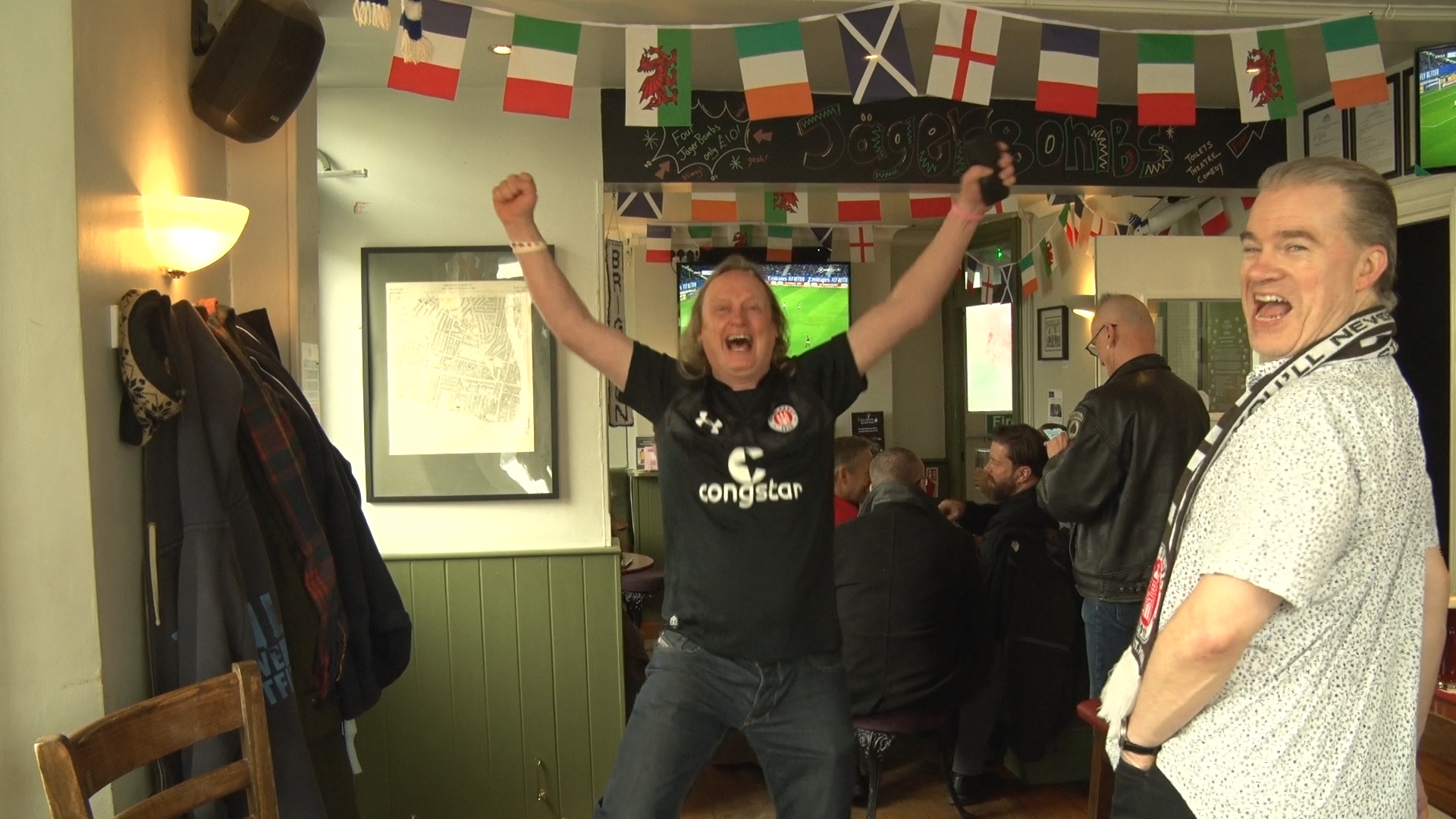German club F.C Sankt Pauli recorded back-to-back wins against their fierce rivals Hamburger SV earlier this year. What is their appeal to a group in Brighton?
Brighton has a somewhat justified reputation as a bit of a party town. Home of the famous DJ FatBoy Slim, but were he to walk into the Duke of Wellington pub this particular Saturday lunchtime, he may have wondered why the dancing and cheering had started without him.
No music is playing from the speakers, but there’s no shortage of singing and all-round euphoria as university lecturer Mark Doidge and the Brighton fan group for German second division club FC St. Pauli go wild. The rest of the pub nicknamed ‘The Boots’, simply can’t work out why.
“St. Pauli for me is two things,” Mark says. “Originally, I heard about them because their fans were seen as a bit counter-cultural, they had left-wing politics and for me that was quite appealing. I started going and met people from St. Pauli, you realise this is something very different.”
Despite having the local Premier League option at their disposal in the form of Brighton and Hove Albion, this group choose to follow this Hamburg-based club. With hundreds of fan groups like this one, the club’s appeal spans globally among the footballing hipsters and the disillusioned. Chiefly due to their left-wing politics which shape how the club is run.
Midfielder Matthew Penney has put St. Pauli 2-0 up in a derby fierce enough BT Sport provides rare coverage of the German second division. Despite a geographical distance of over 600 miles between Brighton and Hamburg, the group refer to opposition Hamburger SV as their ‘local’ rivals. There’s no suggestion of a diluted level of support for the club. The rush of adrenaline as the second goal goes in is palpable as more and more fans flock in to join the half-dozen that started. They jump around in disbelief, hugging, screaming, and videoing, as if they may need to check later that they really are winning the Hamburg derby.
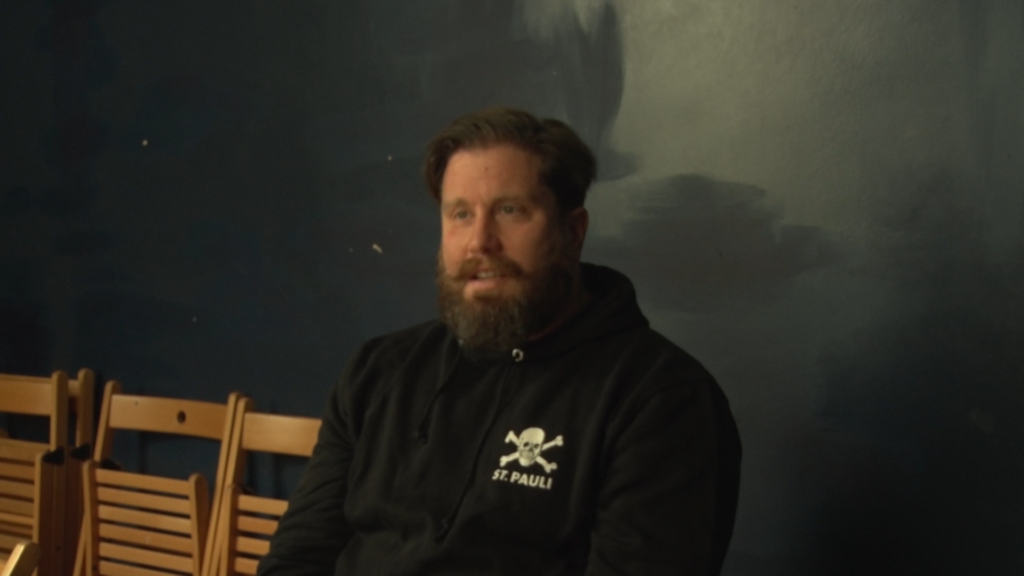
The Brighton group were officially established around seven years ago by Mark’s friends Geoff and Marianna, after experiences with St. Pauli fan groups in the UK and Dublin. They felt Brighton needed their own and it was a prospect too good for Mark to turn down.
“If you have a friendly barman or landlord who will show the game for you then you can at least advertise on social media and then people start coming. Then, the face-to-face is the fun bit – the football is just a by-product.”
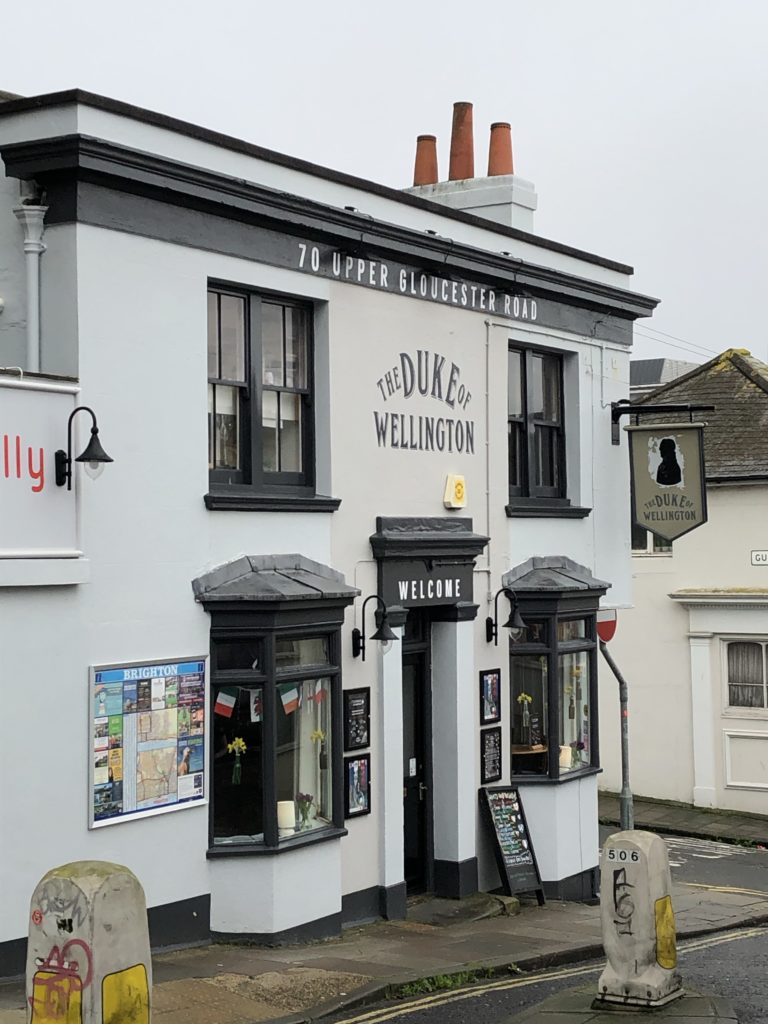
The Duke of Wellington pub, known locally as ‘The Boots’
If football is a by-product, they’ve clearly forgotten the memo. As the hugging finally dies down, Mark gleefully orders another pint, Geoff turns to the rest of the group and gasps. A group member they call Travis because of his likeness to the main character in Taxi Driver can barely believe what is going on. But still manages to look cool, calm and collected.
As those who enter the pub look confused by the sea of black hoodies with skull-and-crossbones logos, the smaller side of the bar look utterly bemused. The screaming from this side prompts them to think their stream of Chelsea versus Tottenham must be have a slight lag. Before a barman clarifies the other TV is showing ‘their weird political German team’.
The genuine shock that St. Pauli are winning is not necessarily a surprise. Most of the group wrote the game off before a ball was kicked, with St. Pauli never being known to dazzle spectators with the quality of football. Traditionally you wanted to watch good quality football in Hamburg, you saw Hamburger SV.
So much of the club’s identity and ethos comes from the context of St. Pauli as a club and an area. Situated in the Hamburg’s Red-Light District, but also a rapidly expanding district that is becoming more affluent and gentrified.
Yet, like many cities seen by outsiders as a trendy location, Hamburg has both areas of great wealth and extreme poverty – As well as the reputation port cities often get for being a little rough around the edges.
The bar staff are already making predictions for Brighton and Hove Albion’s game later on that weekend, a topic shrugged off by Mark and the group. It appears they have found happiness elsewhere. “When you go to certain countries like Germany, people are standing up, they’re having a beer, they’re having a laugh, it’s much more fun,” he says. “It feels much more like it was when I was growing up watching football in the ‘80s and ‘90s. It’s bringing the fun back to football.”
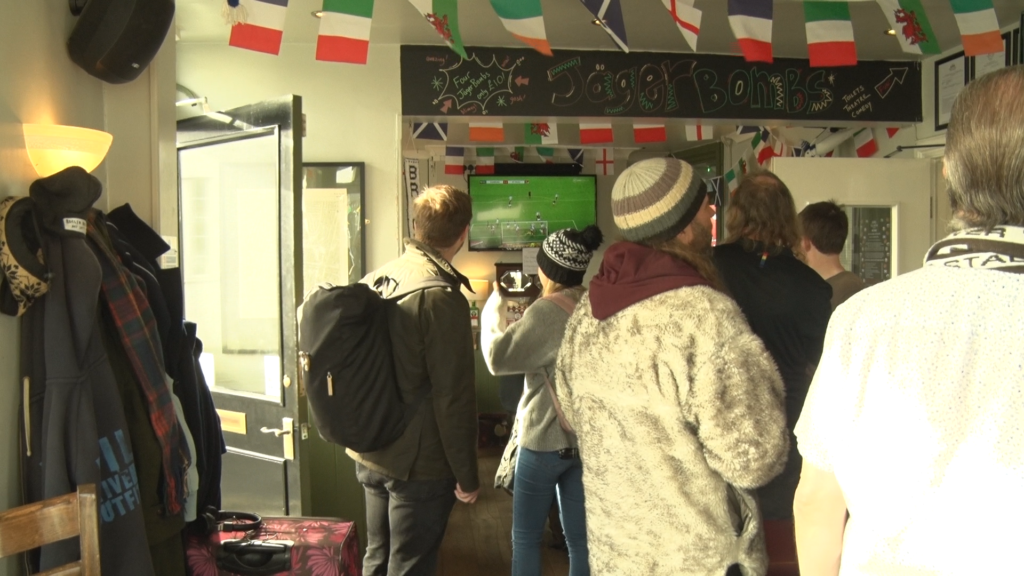
But German football is becoming an increasingly popular option for British fans because of cheap tickets, beer available on the terraces and raucous supporters. “I don’t necessarily think it’s about St. Pauli,” Mark says. “I think it’s more about English football, which is sanitised, we’re turned into customers, there’s not much fun, it’s very quiet.”
Tickets for this game were out of the question for the group, though they say when available fans from all over Britain are warmly received in Hamburg. Their substitution for live football is a trip to Whitehawk FC, a local non-league side themselves containing strong left-wing values among their fanbase. Even Whitehawk commercial director Kevin Miller pops into the pub to show support to their German ideological counterparts.
As a barman strikes up conversation about the Chelsea match shown in the other smaller corner of the pub, everyone in the group sat near the bar turn away disinterested. As well as St. Pauli’s appeal because of their politics, their lack of footballing success has meant they have evaded the intense commercial interest of the Premier League and its vast television money.
Eventually, someone on a bar stool points out that it is fairly handy BT Sport are showing this particular crunch-match. Mark allows himself a wry smile, “Bearing in mind, I’m going to counteract what I’ve just said about corporatisation of the Premier League, and the fact that Sky and BT have taken over and changed football as we know it… but then BT also show St. Pauli games.”
The local major club, Brighton and Hove Albion, have recently climbed the football ladder into the money-soaked heights of the Premier League. Marking their ascent to the big time with a new 30,000-seater stadium, known for sponsorship purposes as the American Express Community Stadium. For Brighton St. Pauli, this is seen as a local example of the version of football that they claim to reject.
When asked why there seems to be no sign of a St. Pauli equivalent in the UK, Mark looks slightly resigned. The reason he follows Whitehawk rather than Brighton and Hove Albion is because non-league football is the only space in British football where political activism and football mingle. Unlike Germany, once clubs rise into the British football pyramid, it is rare the two elements collide. “Part of it is how the ownership model is in Britain, for 100 years it’s been privately owned companies,” he says. “[At Whitehawk] you can sing those political songs or have active engagement, doing things in the local community through your football club and helping people, which you can’t really do through a bigger club. Because the club own it all, they control it, they’ve trademarked it and they want the PR from it.”
As two women enter the pub, both wearing scarves with the St. Pauli unofficial pirate crest a barman asks, “Oh, are you in with the Saint Paul lot today?” They politely nod and ignore the anglicised version of the club’s name. Mark notes the large number of skull-and-crossbones logos and points to his own. A symbol of what they see as their ‘rebel’ status and a celebration of the fact the club preserves its morals, even if their lack of outside investment hinders their on-the-pitch success.
But it is well documented that St. Pauli sit just behind Germany’s most popular clubs in terms of revenue income, making their anti-commercialist values harder to contend with. “It’s a business. The logo and the brand is, what, third most profitable in the Bundesliga, behind Bayern and Dortmund? It’s good business, no one says that these things aren’t contradictory, sometimes slightly nuanced and you have to resolve them within yourself.”
Journalist and German football expert, Raphael Honigstein admits it may not ever be fully possible to escape these contradictions. “The clubs are forced to… I don’t want to say sell themselves but to generate income. And for a club like St. Pauli, their image as anti-commercial, as anti- capitalist I think that creates an obvious problem and I think they are forever trying to negotiate that and trying to do things that they can live with.”
The club commercialise the idea of being anti-commercialist, leading to accusations from fans of other German clubs their appeal to politically minded, disillusioned outsiders is purely a gimmick.
“One of the ironies of the German model is because you don’t have investors, the clubs are forced to commercialise things,” Honigstein says. “They need to generate income; how do you generate income? By selling things. … by trying to grow the brand abroad. So, there is a price to pay, if you will, for not having investment coming in from other places.”
When the club found themselves in an almost 2-million-euro deficit in 2003, the club made money selling t-shirts. Now these t-shirts with the unofficial logo are widespread but also problematic. Jonathan Cable, an academic at the University of Gloucestershire presents a potential get-out-of-jail free card to ease any of these creeping fears of hypocrisy that the British St. Pauli fans may feel: “The way I think about it is because especially at the elite level it’s so commercialised, so rather than buying into a fandom, you’re buying into an identity and ethos.”
It may seem a stretch to make comparisons between the cities of Brighton and Hamburg, yet the group seem largely in agreement that the popularity of Brighton St. Pauli is easier to understand when looking at Brighton’s socio-political context.
Away from the trendy cafes and thrift shops, the city was found to have just over a quarter of its children living in poverty. Despite the varying levels of wealth and social class, the Conservative Party were voted out of Brighton Pavilion in 1997 and for the last ten years the Green Party has comfortably kept their parliamentary seat.
From an outside perspective, Brighton is often labelled as an extremely liberal city, at least in recent decades. Around 15% of adults identify as part of the LGBTQ+ community out of a population of just over a quarter of a million. While the city is celebrated for its tolerance, some tourist reviews market Brighton as “a city, warts and all”. Through all of these trends, it could be argued that Brighton seems to be the perfect location for a fan group based around a club which shares the principles of tolerance and inclusion.
The group’s co-founder, Marianna Ebel is in a unique position to discuss all sorts of aspects of the Brighton faction as a representative of St. Pauli’s global reach. A native Hamburger and fan of St. Pauli for over twenty years, the last eight of these living in Brighton. In her role as a councillor for the Green Party she notices the similarities between Brighton and Hamburg and how the city’s left-wing reputation meant many here knew of the club long before they established an official fan group.
“Both cities are left-leaning and welcome people from outside, especially refugees and other vulnerable people,” she says. “In both cities many people are actively involved in politics and volunteering in local community groups. And in both cities, there is a great protest culture – if they don’t agree with their government’s actions, they will take to the streets.”
Marianna believes British St. Pauli fans are by and large, more than football hipsters and have made a conscious decision based on politics. “Some of the UK St. Pauli fans know more about the club than I do,” she says. “Whereas Hamburg based St. Pauli fans are more likely to get into St Pauli because their family or friends go to the games.”
It’s tense at The Boots now, but probably not as tense as it should be. A couple of disallowed goals light up the second half, but in truth St. Pauli hold onto the win quite comfortably. There is a mix of ecstasy and relief at the final whistle. Marianna quickly gets up to film the cheering and the high-fiving, almost to make sure if it is on camera then it must have actually happened.
The party atmosphere continues on the bus across town to watch Whitehawk. This non-league club are in good form in the 8th tier of English football and were billed as the ones who may win when St. Pauli are inevitably beaten. But now an unlikely double win is on the cards as the group look for a more local mix of sport and left-wing politics.
The club were the focus of a short video by Optus Sport, praised for their vocal yet mild-mannered fans and a place where LGBT fans feel not just confident to attend, but welcomed in.
With British football seldom known for its universal tolerance of all sexualities, creeds and colours, the video shows the Whitehawk ‘Ultras’ sing ‘Homophobia, We Say No’ to the tune of Kumbaya, My Lord and one participant tells Optus Sport “if the referee makes a mistake, the worst we’d ever call him is a Tory.”
Whitehawk was at one stage one of the most deprived areas in the UK, according to supporter Sophie Cook. Yet fans maintain their location and reputation infuses both their club spirit and their politics, typified by their club motto ‘Football for All.’
What this group seem to crave is engagement, a sense that they can feel like active members when so many football fans have been reduced to passive customers.
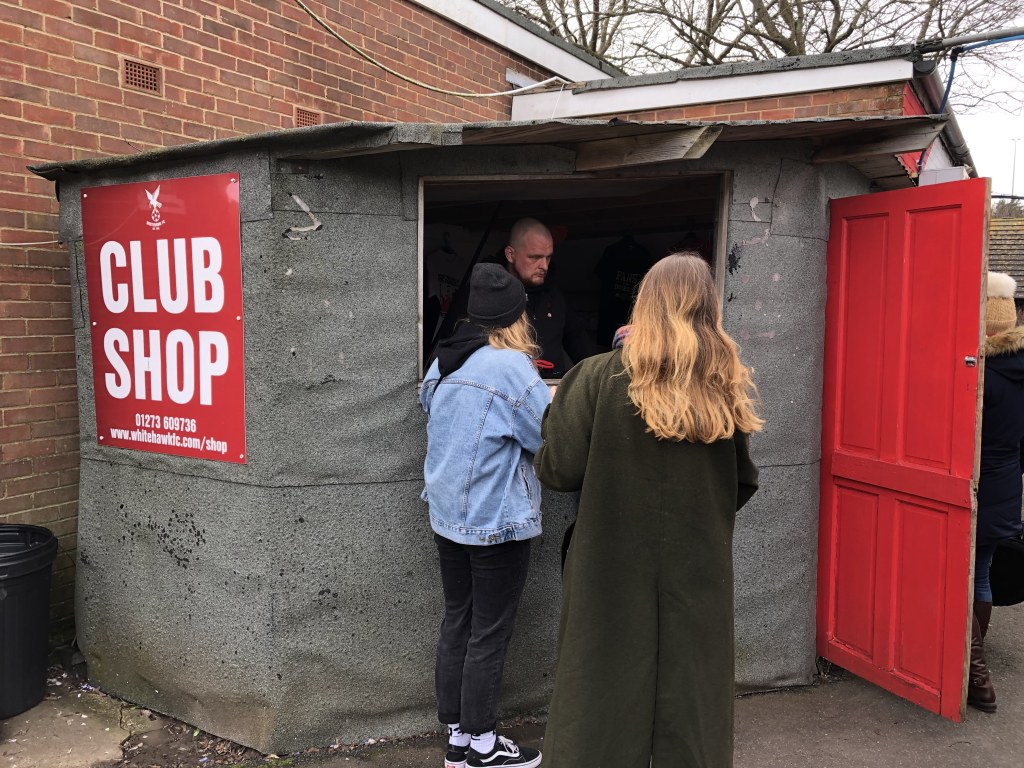
Many fans here say Whitehawk appealed because they want a voice. Not a literal one, mind you, as Whitehawk’s Din End has no shortage of volume. Behind the goal comes a cacophony of noise, in the form of almost bizarrely obscure chants, samba instruments and even a World War II air raid siren blared at every home corner.
The middle of the Din End feels like the most raucous of European grounds, without the element of fear. Fans here are ironically named ‘Ultras’ because of the connotations with violent right-wing groups in some Italian football clubs. Here, the fans seem to start any random song that comes into their head, as long as its lyrics convey their left-wing ethos. They even find time to tell the opposition goalkeeper off for swearing.
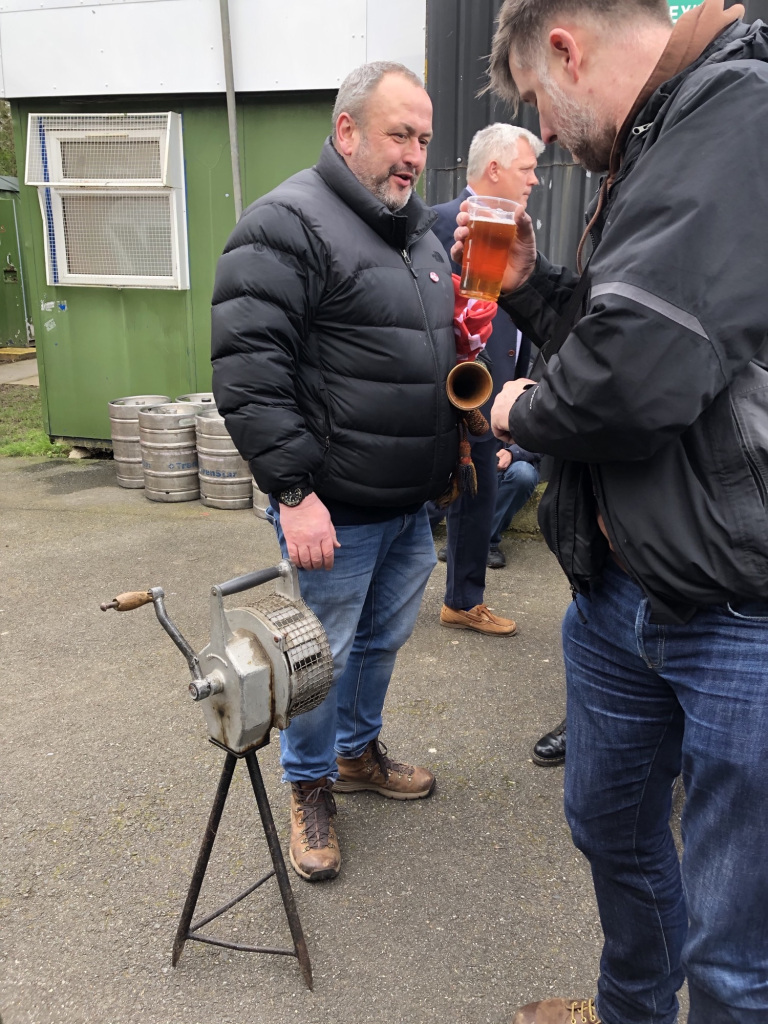
As the day comes to a close, social media of the FCSP fan groups across the U.K enjoy a rare opportunity to be smug after their unlikely victory. But for Mark, the appeal is about more than just football.
“When I was younger it was just a club with a cool symbol,” Mark says. “Whereas now I think it’s real people doing great stuff when it doesn’t feel like many people in football are doing anything good. I think the human bit has come back into it.”
